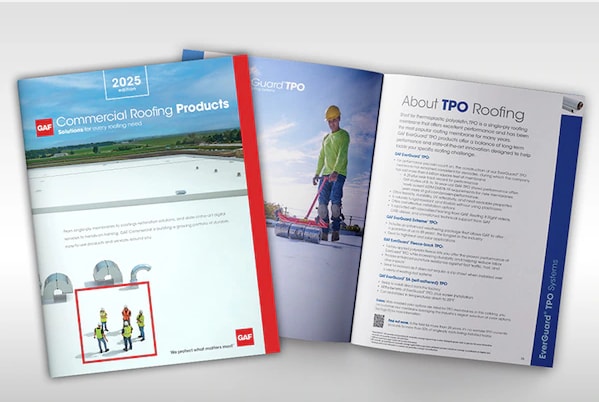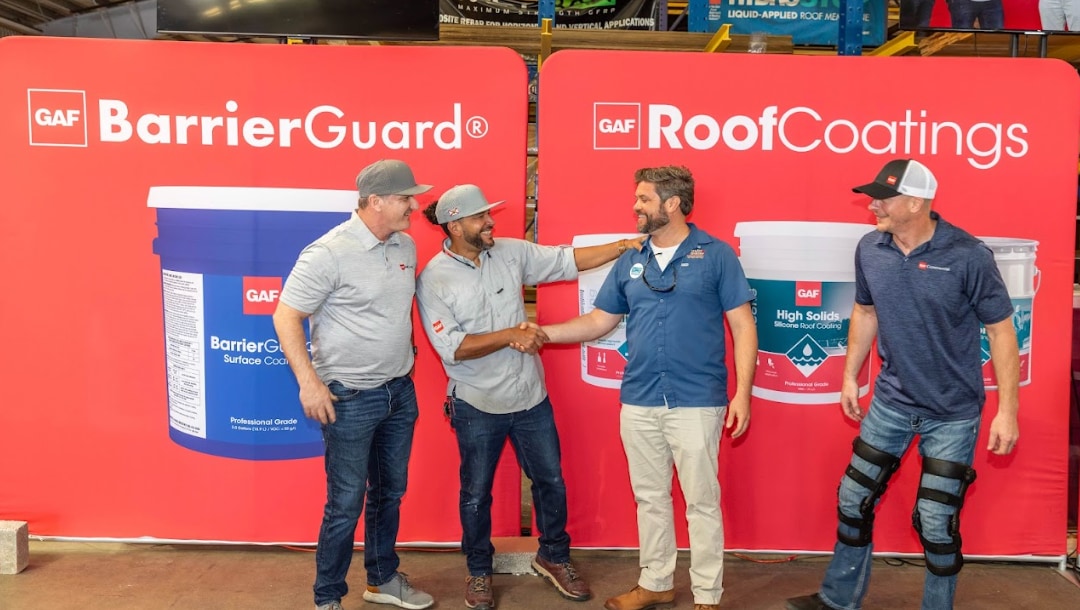If you're a residential roofing contractor thinking about expanding into the commercial sector, you're not alone. Plenty of roofing contractors start their companies with a focus on the residential market and then make the decision to expand into commercial roofing. Adding a commercial division can seem like a daunting task, but it doesn't have to be if you take it one step at a time.
The first step is to listen to what people in the industry have to say about what makes commercial roofing different. Consider talking to commercial contractors in your network or browsing resources online, such as these interviews with GAF Master Select Contractors who share their experiences in this space, to get an idea of what to expect.
For example, Bo Byers of the Oklahoma-based Byers Company explains that commercial roofing differs "not just in shape and size, but also in how the whole business cycle works." This can create changes in cash flow that a potential commercial roofer should be prepared for.
Similarly, Ty Smith of Smith & Ramirez Roofing in El Paso, Texas, adds that "one commercial job could be the equivalent to 20 residential roofs or more." Knowing about these types of differences upfront can help you create a business plan that accounts for them.
Do Your Homework on Commercial Roofing Techniques
Along with researching the industry, you'll, of course, want to learn about the techniques behind commercial roofing. As with any new endeavor, you can begin with online research.
For starters, GAF has a playlist of Roofing it Right videos that cover a range of roofing techniques, which can be especially useful for professionals looking for an introduction to commercial concepts.
Once you've learned about the different types of roofing systems and their nuances, it's important to consider the commercial tools and equipment that you will need for installation. The specialized resources represent a more significant investment than what a residential roofer is used to spending, but don't let that turn you away from expanding into the commercial sector. There are ways to get started that don't require as much upfront investment.

Start with an Easy-to-Learn System
You might want to consider narrowing your focus to a specific area of commercial roofing. For instance, roof coatings are gaining popularity as a way to extend the life of a structurally sound roofing system without tearing off the existing roof.
Installing roof coatings is relatively easy and doesn't require expensive equipment such as robotic welders or roofing kettles, making it a great specialty for starting out as a commercial contractor. In fact, most systems can be spray-applied or installed using a roller.
"Roof coatings are essential in Puerto Rico due to our island's unique environmental conditions," explained Edgar Feliciano, GAF Technical Sales Representative. " We battle with intense tropical heat, heavy rainfall, and high humidity, which can cause significant wear and tear to our roofs over time. A roof coating's ability to be sustainable, UV/moisture resistant, all the while remaining cost-effective, has made it the choice of local contractors."
Coatings are easy to learn, but, like any roofing system, they need to be correctly installed to properly protect the building and keep it watertight.

Take Advantage of Free Hands-On Training
Feliciano encouraged aspiring commercial contractors to take advantage of the resources that GAF offers, including hands-on training sessions. "The learning curve for installing water-based acrylic coatings and easy-to-use silicone-based systems is very small," they say. "After attending a two-day training seminar, contractors are ready to get started."
Having the opportunity to learn and do it yourself before getting on customers' roofs is key to success. Training programs like those offered by the GAF Center for the Advancement of Roofing Excellence (CARE) let you do just that. Practical training gives you hands-on opportunities to learn both time-tested and innovative installation techniques from industry veterans.
If it's just not feasible for you to attend an in-person training, you can turn those rainy days into learning days and watch the recorded training webinars online.
If you are still apprehensive about your first job after attending training in person or watching the recorded webinars, reach out to the wide network of GAF representatives who are available to come to the jobsite and help you make your first commercial job a success. Whether that is a coatings application or a more complex commercial installation, like TPO or PVC, the GAF team is ready to guide you through the project. Find your local GAF technical sales rep online.
Attend Industry Trade Shows
Roofing industry trade shows are an excellent place to learn more about commercial roofing techniques, products, and equipment. The largest industry show with the most learning opportunities is the International Roofing Expo, which takes place in February of each year.
If attending the international show is out of reach, seek out your local roofing contractor association. They often host smaller regional trade shows that feature educational classes as well as an expo hall where you can talk to vendors and see commercial roofing products firsthand. You'll be able to meet and talk to other contractors, which can help you learn about the challenges and opportunities of the commercial side of the business.
Also, take time to explore the website for the National Roofing Contractors Association, as the group offers a robust library of learning opportunities. Topics range from installation of different types of roofing systems to the fundamentals of business management, workforce development, marketing and sales, and more.

Grow with Confidence
Expanding into a new business can be a daunting endeavor, but taking the time to learn as much as you can about your industry is one of the best ways to set yourself up for success.
GAF is here to help you grow your roofing skills and commercial business services with confidence. Visit the GAF website to explore its library of roofing resources for professionals.

